-
 Bitcoin
Bitcoin $88,575.4133
1.33% -
 Ethereum
Ethereum $1,623.1195
-0.94% -
 Tether USDt
Tether USDt $1.0000
0.01% -
 XRP
XRP $2.1040
-0.96% -
 BNB
BNB $605.9509
0.36% -
 Solana
Solana $139.9862
-0.01% -
 USDC
USDC $1.0000
0.00% -
 Dogecoin
Dogecoin $0.1637
1.09% -
 TRON
TRON $0.2482
1.98% -
 Cardano
Cardano $0.6392
-1.18% -
 Chainlink
Chainlink $13.3059
-1.43% -
 UNUS SED LEO
UNUS SED LEO $9.0739
-4.00% -
 Avalanche
Avalanche $20.1274
-2.31% -
 Stellar
Stellar $0.2484
-4.08% -
 Sui
Sui $2.3116
2.05% -
 Shiba Inu
Shiba Inu $0.0...01252
-0.73% -
 Toncoin
Toncoin $2.9119
-3.20% -
 Hedera
Hedera $0.1725
0.04% -
 Bitcoin Cash
Bitcoin Cash $346.0750
1.19% -
 Hyperliquid
Hyperliquid $18.2428
0.88% -
 Litecoin
Litecoin $79.3117
-2.01% -
 Polkadot
Polkadot $3.7471
-4.36% -
 Dai
Dai $1.0000
0.00% -
 Bitget Token
Bitget Token $4.4341
-0.56% -
 Ethena USDe
Ethena USDe $0.9992
0.00% -
 Pi
Pi $0.6353
0.33% -
 Monero
Monero $216.8188
0.48% -
 Pepe
Pepe $0.0...08105
3.48% -
 Uniswap
Uniswap $5.3764
-1.05% -
 OKB
OKB $51.0901
0.18%
Are NFTs suitable for identity verification and certification?
NFTs offer immutable identity records, boosting trust, but scalability, interoperability, privacy, and legal frameworks need development for widespread adoption in verification.
Feb 28, 2025 at 07:48 am
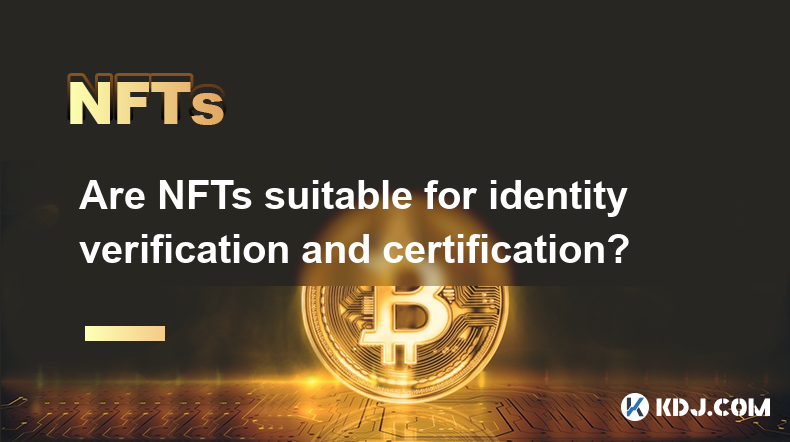
Are NFTs Suitable for Identity Verification and Certification?
Key Points:
- Immutability and Transparency: NFTs' inherent immutability on the blockchain offers a tamper-proof record of identity data, enhancing trust and transparency. However, the complexity of managing access and ensuring data privacy needs careful consideration.
- Interoperability and Standardization: The lack of widespread interoperability and standardization across different NFT platforms poses a challenge for seamless identity verification across various systems. Developing universal standards is crucial for wider adoption.
- Scalability and Cost: The scalability of blockchain networks and the associated transaction costs can hinder the widespread use of NFTs for identity verification, particularly for large-scale applications. Layer-2 solutions and alternative blockchain technologies may offer solutions.
- Data Privacy and Security: While the blockchain provides transparency, the sensitive nature of identity data requires robust privacy-preserving mechanisms. Zero-knowledge proofs and other cryptographic techniques can help address these concerns.
- Legal and Regulatory Frameworks: The absence of clear legal and regulatory frameworks surrounding the use of NFTs for identity verification creates uncertainty and potential legal risks. Developing robust legal frameworks is crucial for fostering trust and legitimacy.
Exploring the Suitability of NFTs for Identity Verification and Certification:
- Immutability and Transparency on the Blockchain:
The fundamental strength of NFTs lies in their immutability. Once an NFT representing an identity is minted on the blockchain, its data cannot be altered or deleted without leaving a verifiable trace. This characteristic is profoundly appealing for identity verification and certification because it guarantees the authenticity and integrity of the identity record. Unlike traditional centralized databases that are susceptible to manipulation and hacking, the decentralized nature of blockchain makes it far more resistant to fraud. Furthermore, the transparency of blockchain technology allows anyone (with appropriate access permissions) to verify the authenticity of an NFT-based identity. This enhances trust and accountability, as the entire history of the identity is publicly auditable. However, this transparency needs to be carefully balanced with privacy considerations. While the transaction history of the NFT is public, the sensitive personal information linked to the NFT should ideally be kept private using techniques like zero-knowledge proofs, which allow verification of identity claims without revealing the underlying data. The challenge lies in designing systems that efficiently manage access control, ensuring only authorized parties can access sensitive information while maintaining the transparency and immutability that are crucial for trust. Sophisticated cryptographic techniques and access control mechanisms are essential to realize the full potential of NFT-based identity verification while safeguarding sensitive data. Consider the potential for malicious actors to attempt to exploit vulnerabilities in the system, targeting the cryptographic mechanisms or exploiting flaws in the access control policies. Robust security audits and ongoing maintenance are vital to ensure the system’s resilience against such threats. The process of securely managing keys and preventing unauthorized access is paramount.
- Interoperability and Standardization Challenges:
The current landscape of NFT platforms is fragmented, with various blockchains and protocols operating independently. This lack of interoperability poses a significant hurdle to the widespread adoption of NFTs for identity verification. Imagine a scenario where an individual has their identity verified using an NFT on one platform, but this verification is not recognized by another platform. This lack of seamless integration between systems hinders the efficiency and utility of NFT-based identity solutions. The development of universal standards and protocols is crucial to overcome this interoperability challenge. Standardized data formats and APIs are necessary to allow different systems to communicate and exchange information seamlessly. This would enable users to carry their verified identities across various platforms and services, facilitating a more streamlined and user-friendly experience. Furthermore, standardized security protocols are crucial to ensure the integrity and security of the exchanged identity data. Interoperability efforts require collaboration among different stakeholders, including blockchain developers, identity providers, and regulatory bodies. Without a concerted effort towards standardization, the fragmented nature of the NFT ecosystem will continue to limit the potential of NFT-based identity verification. The technical complexity of achieving interoperability across different blockchain networks adds another layer of challenge.
- Scalability and Cost Considerations:
The scalability of blockchain networks is a crucial factor affecting the viability of NFT-based identity verification. Many existing blockchains struggle to handle a large volume of transactions, leading to high transaction fees and slow processing times. This can make it impractical to use NFTs for large-scale identity verification applications, especially when dealing with millions of users. The cost of minting and transferring NFTs can also be a significant barrier, especially for individuals or organizations with limited resources. To address these scalability and cost concerns, several strategies are being explored. Layer-2 scaling solutions, such as rollups and sidechains, aim to increase transaction throughput and reduce costs by processing transactions off-chain before committing them to the main blockchain. Alternative blockchain technologies, such as those designed specifically for high-throughput transactions, may also offer more scalable solutions. However, the adoption of these solutions requires careful consideration of their security implications and potential trade-offs between scalability and decentralization. The optimization of smart contracts used for managing NFT-based identities is also crucial to minimize transaction costs and improve efficiency. Exploring more cost-effective methods of minting and transferring NFTs, such as batch minting or utilizing cheaper blockchain networks, could also help make NFT-based identity verification more accessible.
- Data Privacy and Security Concerns:
While the immutability of the blockchain offers advantages in terms of security and trust, it also presents challenges related to data privacy. The public nature of blockchain transactions raises concerns about the exposure of sensitive personal information. To mitigate these risks, various privacy-enhancing technologies are being developed. Zero-knowledge proofs, for example, allow individuals to prove their identity without revealing their underlying personal data. Homomorphic encryption techniques can enable computations on encrypted data without decrypting it, preserving privacy while allowing for verification. Secure multi-party computation allows multiple parties to jointly compute a function over their private inputs without revealing anything beyond the output. The implementation of these techniques requires careful consideration of their computational complexity and the trade-offs between privacy and efficiency. Furthermore, robust security measures are essential to protect against attacks targeting the smart contracts and underlying infrastructure. Regular security audits and vulnerability assessments are necessary to identify and address potential weaknesses. The careful design and implementation of access control mechanisms are also crucial to ensure that only authorized parties can access sensitive data. The integration of robust cryptographic techniques and secure data storage mechanisms is vital for maintaining the confidentiality and integrity of personal information within NFT-based identity systems.
- Legal and Regulatory Landscape:
The use of NFTs for identity verification is still relatively new, and the legal and regulatory landscape is still evolving. The lack of clear legal frameworks creates uncertainty and potential risks for organizations and individuals adopting this technology. Questions around data ownership, liability, and compliance with existing data protection regulations need to be addressed. The development of robust legal frameworks is crucial to foster trust and encourage wider adoption of NFT-based identity solutions. Collaboration between regulatory bodies, technology developers, and legal experts is needed to create clear guidelines and standards. International cooperation is also important to ensure consistency and avoid fragmentation of regulatory approaches. Legal frameworks should address issues such as data privacy, security, and the potential for misuse of NFT-based identities. Clear rules and regulations are needed to ensure accountability and prevent fraud. Furthermore, mechanisms for dispute resolution and redress should be established to protect the rights of individuals and organizations using NFT-based identity systems. The legal and regulatory landscape will play a crucial role in shaping the future of NFT-based identity verification, and proactive engagement with these issues is vital for the responsible development and adoption of this technology.
FAQs:
Q: Are NFTs truly secure for storing identity information?
A: The security of NFT-based identity systems depends on several factors, including the underlying blockchain's security, the robustness of the smart contracts, and the implementation of privacy-enhancing technologies. While the immutability of the blockchain provides a high level of security against data tampering, vulnerabilities can exist in the smart contracts or in how the NFTs are integrated with other systems. The use of strong cryptography and secure key management practices is crucial to minimize the risks. The security of the system is only as strong as its weakest link.
Q: What are the privacy implications of using NFTs for identity verification?
A: The public nature of blockchain transactions raises concerns about the exposure of sensitive personal data. However, techniques like zero-knowledge proofs can be used to verify identity claims without revealing the underlying data. The design of the system is crucial in determining the level of privacy protection afforded to users. Carefully considered access control mechanisms and encryption techniques are vital to ensure data confidentiality.
Q: How can the scalability challenges of NFTs be addressed for widespread identity verification?
A: Layer-2 scaling solutions, such as rollups and sidechains, can significantly improve transaction throughput and reduce costs. Alternative blockchain technologies designed for high-throughput transactions are also being developed. Efficient smart contract design and the use of more cost-effective minting methods can also contribute to enhanced scalability.
Q: What are the legal and regulatory hurdles to overcome for widespread adoption of NFT-based identity verification?
A: The lack of clear legal frameworks around data ownership, liability, and compliance with data protection regulations poses a significant challenge. International cooperation is needed to establish consistent standards and guidelines. Addressing issues of data privacy, security, and the potential for misuse of NFT-based identities is crucial for building trust and ensuring responsible adoption.
Disclaimer:info@kdj.com
The information provided is not trading advice. kdj.com does not assume any responsibility for any investments made based on the information provided in this article. Cryptocurrencies are highly volatile and it is highly recommended that you invest with caution after thorough research!
If you believe that the content used on this website infringes your copyright, please contact us immediately (info@kdj.com) and we will delete it promptly.
- AVAX Price Prediction 2025: Will Avalanche Reach New Heights?
- 2025-04-22 17:50:12
- XRP Price Prediction Shows Bullish Momentum After Coinbase Lists Its Futures Contracts
- 2025-04-22 17:50:12
- Bitcoin is surging again, capturing the spotlight in the crypto world.
- 2025-04-22 17:45:12
- Pi Network (PI) Holds Above $0.63: $5 Price Prediction and Whale Accumulation Fuel Optimism
- 2025-04-22 17:45:12
- One of the cryptocurrencies that ranked in the eleventh place, Chainlink, has been in the spotlight as it is traded at $13.12
- 2025-04-22 17:40:12
- Pi Network's Token Structure Promises a Fair Launch
- 2025-04-22 17:40:12
Related knowledge
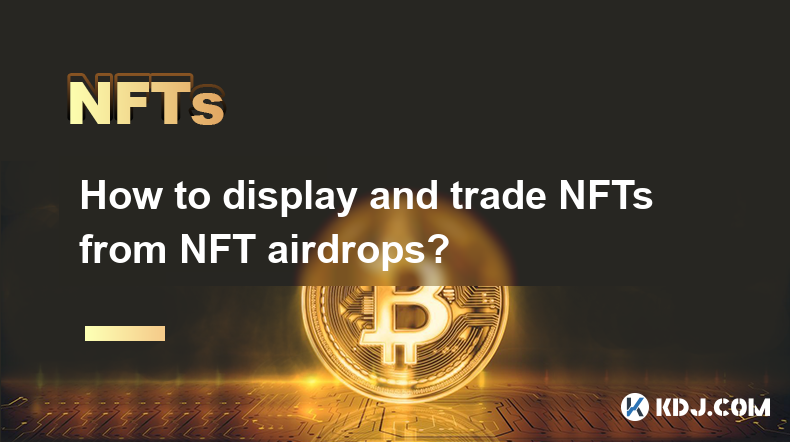
How to display and trade NFTs from NFT airdrops?
Apr 18,2025 at 04:42am
How to Display and Trade NFTs from NFT Airdrops? NFT airdrops have become a popular way for projects to distribute their tokens and engage with their community. If you've received NFTs through an airdrop, you might be wondering how to display and trade them. This article will guide you through the process step-by-step, ensuring you can showcase your NFT...
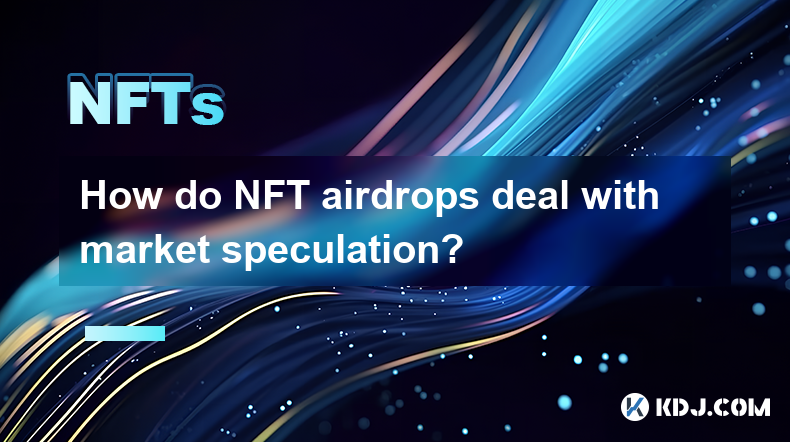
How do NFT airdrops deal with market speculation?
Apr 20,2025 at 10:28pm
NFT airdrops have become a significant phenomenon in the cryptocurrency space, often used as a marketing tool to distribute tokens or digital assets to a wide audience. However, they also introduce elements of market speculation that can impact the value and perception of NFTs. This article explores how NFT airdrops deal with market speculation, delving...
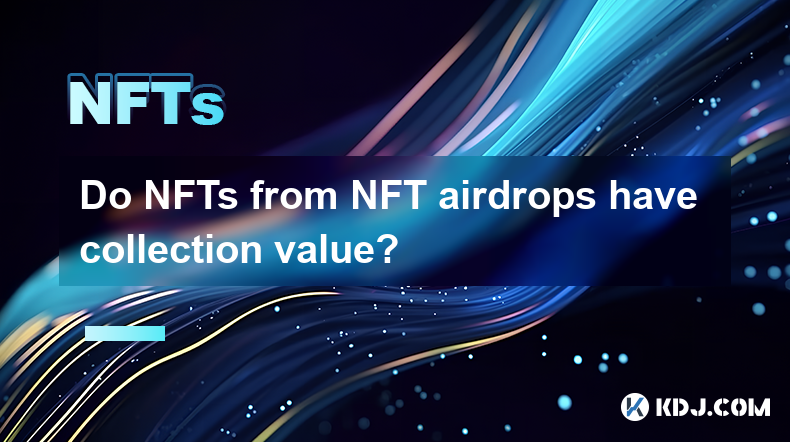
Do NFTs from NFT airdrops have collection value?
Apr 18,2025 at 11:49pm
NFTs, or non-fungible tokens, have become a significant part of the cryptocurrency ecosystem, and NFT airdrops are one way for projects to distribute these digital assets to their community. A common question that arises is whether NFTs received from airdrops have any collection value. To answer this question, we need to delve into various aspects of NF...
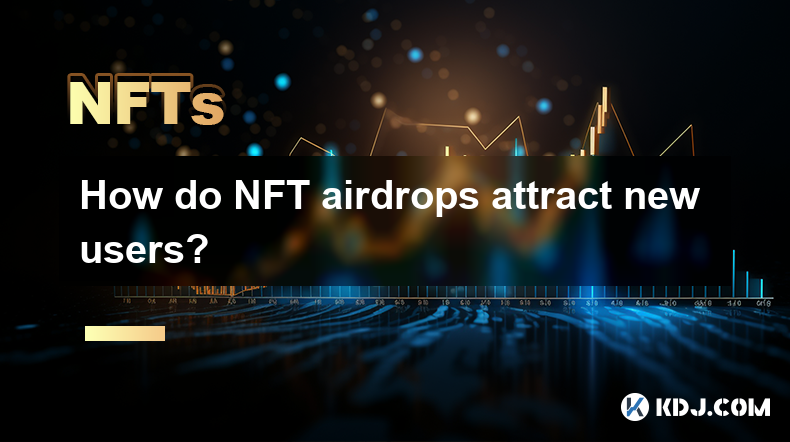
How do NFT airdrops attract new users?
Apr 21,2025 at 07:21am
NFT airdrops have become a popular strategy within the cryptocurrency community to attract new users and engage existing ones. By distributing free NFTs to a targeted audience, projects can create buzz, increase visibility, and foster a sense of community. This method leverages the allure of free digital assets to draw in participants who might not have...
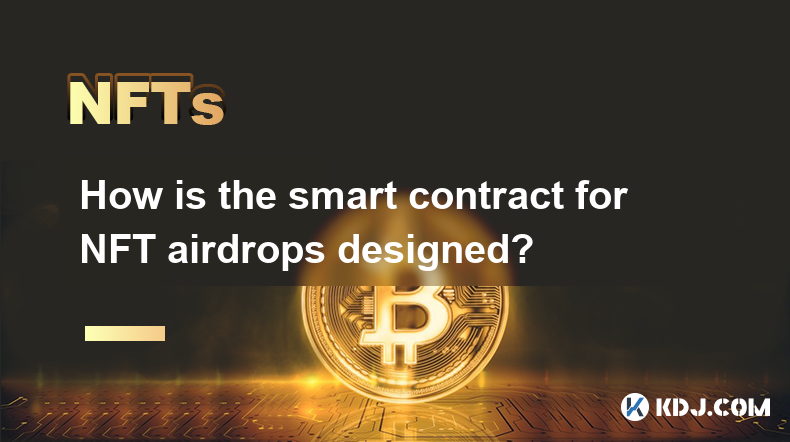
How is the smart contract for NFT airdrops designed?
Apr 18,2025 at 03:10am
The design of a smart contract for NFT airdrops is a complex process that requires careful consideration of various factors to ensure the airdrop is executed smoothly and securely. This article will delve into the intricacies of how such a smart contract is designed, focusing on key components, security measures, and the implementation process. Key Comp...

Will NFT airdrops affect the market value of NFT?
Apr 22,2025 at 06:56am
The impact of NFT airdrops on the market value of NFTs is a topic of significant interest within the cryptocurrency and digital asset community. NFT airdrops, where creators or platforms distribute free NFTs to a targeted group of recipients, can have various effects on the market value of NFTs. This article delves into the different ways NFT airdrops c...

How to display and trade NFTs from NFT airdrops?
Apr 18,2025 at 04:42am
How to Display and Trade NFTs from NFT Airdrops? NFT airdrops have become a popular way for projects to distribute their tokens and engage with their community. If you've received NFTs through an airdrop, you might be wondering how to display and trade them. This article will guide you through the process step-by-step, ensuring you can showcase your NFT...

How do NFT airdrops deal with market speculation?
Apr 20,2025 at 10:28pm
NFT airdrops have become a significant phenomenon in the cryptocurrency space, often used as a marketing tool to distribute tokens or digital assets to a wide audience. However, they also introduce elements of market speculation that can impact the value and perception of NFTs. This article explores how NFT airdrops deal with market speculation, delving...

Do NFTs from NFT airdrops have collection value?
Apr 18,2025 at 11:49pm
NFTs, or non-fungible tokens, have become a significant part of the cryptocurrency ecosystem, and NFT airdrops are one way for projects to distribute these digital assets to their community. A common question that arises is whether NFTs received from airdrops have any collection value. To answer this question, we need to delve into various aspects of NF...

How do NFT airdrops attract new users?
Apr 21,2025 at 07:21am
NFT airdrops have become a popular strategy within the cryptocurrency community to attract new users and engage existing ones. By distributing free NFTs to a targeted audience, projects can create buzz, increase visibility, and foster a sense of community. This method leverages the allure of free digital assets to draw in participants who might not have...

How is the smart contract for NFT airdrops designed?
Apr 18,2025 at 03:10am
The design of a smart contract for NFT airdrops is a complex process that requires careful consideration of various factors to ensure the airdrop is executed smoothly and securely. This article will delve into the intricacies of how such a smart contract is designed, focusing on key components, security measures, and the implementation process. Key Comp...

Will NFT airdrops affect the market value of NFT?
Apr 22,2025 at 06:56am
The impact of NFT airdrops on the market value of NFTs is a topic of significant interest within the cryptocurrency and digital asset community. NFT airdrops, where creators or platforms distribute free NFTs to a targeted group of recipients, can have various effects on the market value of NFTs. This article delves into the different ways NFT airdrops c...
See all articles























































































